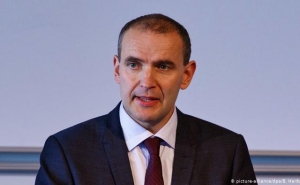 Iceland Case Wake-Up Call for the EU
Iceland Case Wake-Up Call for the EU

The sudden refusal of
"The doors remain open for Iceland" - the EU spokeswoman Maja Kocijancic announced as
It seemed like the EU was not so much surprised by this move which became a moment of perplexity. Although taking into account nowadays’ political, economic and social hardships that the Union is facing with Greece, Great Britain, France, Italy and the Eastern members, Icelands’ move was natural from the point of self-defense. So can this move be named another wake-up call for the European Union?
First, let us get back to the roots. Being already a member of European Economic Area (EEA) since 1970, associated member since 1994 and a member of Schengen zone since 2001,
From 2008-2011 strengthening of the financial crisis and instability of national currency forced the nation to start thinking about joining the euro. However, in order to become a eurozone member a country should first of all be an EU member. It seems that today
The fact is that
 By that time the new government froze the accession talks in 2013, 27 of the 35 legislative chapters had been opened and 11 concluded. But disputes remained on several issues, mainly those regarding agriculture and fisheries. Common Fisheries Policy was always a continued sticking point between
By that time the new government froze the accession talks in 2013, 27 of the 35 legislative chapters had been opened and 11 concluded. But disputes remained on several issues, mainly those regarding agriculture and fisheries. Common Fisheries Policy was always a continued sticking point between
According to surveys conducted by Eurobarometer, by the time of the start of official negotiations 54% of the population rejected
In a way, the aforementioned could become an opportunity for the EU, however the bureaucracy, as in many other cases became an obstacle. Could this be considered a win-win situation? At the times of negotiations it could, but now it is definitely not the case. As the country’s Foreign Minister, Gunnar Bragi Sveinsson wrote on his website "
According to January, 2014 poll, 67.5% of Icelanders support holding a referendum on whether to continue accession negotiations, or not. While another poll of February, 2015 showed that 82% are in favour of holding the referendum. In February, the governing parties agreed to formally withdraw the membership application, without first holding a referendum on the matter, and submitted a bill to Althing (Icelandic parliament) seeking their approval for this move.
Under Icelandic law, it is not the Government but the Parliament which decides to end negotiations. That is why when Foreign Minister announced that he had sent a letter to the EU on withdrawing the application for membership, without the approval of the Althing, the European Union stated that
It is worth mentioning that in EU history there are cases of withdrawing or rejecting the accession talks:
Taking into consideration all these, we must assume that in order to annul official membership negotiations the country needs to hold a public referendum, reflecting the will of the population. In this case taking into account the data of the Eurobarometer starting from the year the country launched its negotiations, the outcome of the referendum is very much likely to be for annulling the continuation of negotiations.
It is important to stress the fact that in case of success this may become a bad precedent for today’s official candidates (
On the other hand a small percentage of the people for Iceland's EU membership tries to make its voice heard: after the government dropped the membership negotiations some 7,000 Icelanders took the streets of
Since coming into power in 2013,
As for today, it seems like there is nothing left for the Union except naming this announcement a sovereign decision of
Other materials on this subject
- FT: Coronavirus Pandemic Threatens Livelihoods of 59m European Workers Under McKinsey’s pessimistic scenario, in which severe social distancing restrictions are maintained through the summer to contain the spread of the virus, EU unemployment could double to 11.2 per cent...
- Italy Coalition Agrees on New Budget, Expects EU Approval The European Commission rejected the Italian budget in October, saying it would not lower the country’s huge debt and declaring it in clear breach of EU fiscal rules. Rome submitted a revised plan last...
- EU Shoots Down Italy's Budget Plans, Again The Commission confirmed its assessment that "Italy's draft budget plan is in particularly serious non-compliance" with EU debt rules, Commission Vice President Valdis Dombrovskis said in Brussels.
- Denmark Is The Most Expensive EU Country Denmark was followed by Luxembourg (127 percent), Ireland and Sweden (both 125 percent), Finland (122 percent) and the United Kingdom (117 percent).
- Eurozone Growth Exceeds Expectations For the past 12 months, the growth rate was 2.5%.
Other materials on this subject
- The European Union Has Decided to Abandon Russian Coal In the Summer Many countries have joined these sanctions, even if this necessarily implies economic costs for ourselves," he noted.
- Germany Faces Steep Recession if Russian Oil and Gas Halted, Bank Lobby Says "The situation would be even worse if imports or supplies of Russian oil and natural gas were to be halted. A significant recession in Germany would then be virtually unavoidable," Sewing told journalists.
- EU Leaders Agree on Joint Gas Purchases Last year, the European Commission proposed to the EU countries a system of joint purchases of strategic gas reserves as a way to provide a buffer against possible supply disruptions. Fears of supply disruptions...
- European Union Launches “Team Europe” Package to Support Partner Countries with More than €20 Billion: Reuters Most of the money is being reallocated from other, less urgent EU foreign aid schemes in the EU’s common budget, but Borrell said the European Investment Bank, the European Bank for Reconstruction and...
- The Guardian: EU Leaders Clash Over Economic Response to Coronavirus Crisis Meeting via a video link, the EU’s 27 leaders papered over deep divisions by agreeing that another fortnight was needed to discuss ambitious economic recovery plans. After a testy debate over "coronabonds",...
-
 17:08
17:08The regular session of the Anti-corruption Policy Council takes place in Jermuk
-
 15:05
15:05The Prime Minister sends congratulatory messages to the supreme leader of Iran and the President of Iran
-
 11:11
11:11Armenia sends earthquake aid to Turkey
-
 10:43
10:43Commemoration of the Pontiff St. Sahak Partev
-
 09:16
09:16Some roads are closed and difficult to pass in Armenia
-
 19:55
19:55Phone conversation of the Foreign Minister of Armenia with the U.S. Assistant Secretary of State for European and Eurasian Affairs
-
 18:30
18:30Prime Minister Pashinyan and President Khachaturyan meet
-
 18:20
18:20Ararat Mirzoyan with Co-Chairman of the OSCE Minsk Group of France Brice Roquefeuil
-
 17:01
17:01Humans could land on Mars within 10 years, Musk predicts
-
 16:45
16:45France, US urge 'immediate' end to Nagorno Karabakh blockade
-
 16:01
16:01Blockaded Nagorno Karabakh launches fundraiser to support quake-hit Syria
-
 15:59
15:59Earthquake death toll in Turkey rises to 18,342
-
 15:43
15:43Ararat Mirzoyan Held a Telephone Conversation with Sergey Lavrov
-
 15:06
15:06French president rules out fighter jet supplies to Ukraine in near future
-
 14:47
14:475 Day Weather Forecast in Armenia
-
 14:44
14:44President Vahagn Khachaturyan wrote a note in the book of condolences opened in the Embassy of Syria in Armenia
-
 14:20
14:20Azerbaijan’s provocations impede establishment of peace and stability – Armenian FM tells Russian Co-Chair of OSCE MG
-
 12:57
12:57France representation to OSCE: Paris calls on Azerbaijan to restore freedom of movement through Lachin corridor
-
 11:40
11:40Command of Kosovo forces highly appreciated preparation of Armenian peacekeepers
-
 10:16
10:16The United States withdrew from sanctions against Syria for six months the provision of assistance after the earthquake
day
week
month
Humidity: %
Wind: km/h





